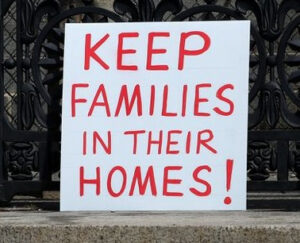In 2020 and 2021, the Massachusetts Law Reform Institute Helped Thousands of Low-Income Families and Individuals across the Commonwealth
Working with Massachusetts Legislators Has Eased Food Insecurity, Kept People Housed, Moved Children Out of Deep Poverty
Boston, Mass. (December 21, 2021) – Through legal, policy, and legislative advocacy, the Massachusetts Law Reform Institute (MLRI) helped thousands of families and individuals living in poverty throughout 2020 and 2021. MLRI is a nonprofit poverty law and policy center that advocates to advance policies and practices that secure economic, racial, and social justice for low-income communities.
“No period in recent memory has placed as much stress on people living in poverty than the last 18 months,” said Georgia Katsoulomitis, MLRI’s executive director. “MLRI has spent more than five decades fighting on their behalf at both the state and national levels. We have an expansive network of advocacy partners and community organizations we collaborate with to advance high impact initiatives. This strong foundation allowed us to move quickly to work with Massachusetts legislators and with the Baker-Polito administration to help the Commonwealth’s most vulnerable when the COVID-19 pandemic hit. Those efforts have had considerable impact on the lives of thousands of Massachusetts residents throughout 2020 and 2021.”
House HWM Legislation a Good Start but Legislature Should Address Opportunities

On Monday, October 25, the Commonwealth’s House Ways and Means (HWM) Committee released a bill that details how the state will spend the billions of dollars that Massachusetts received through the American Rescue Plan Act (ARPA). In total, the Commonwealth received $8.7 billion from the federal government, with $5.3 billion allocated to the state and $3.4 billion designated for municipalities.
Unfortunately, some key priorities that will help the most vulnerable of the state’s residents — those who this funding is supposed to help — were left out of the HWM bill. The bill includes no support for Right to Counsel, despite the fact that the COVID Eviction Legal Help Program (CELHP) has been successful in preventing evictions. There is also no increase in grants for children living in deep poverty.
President Biden and Congress made their priorities clear when they passed ARPA this past spring. These funds are meant to help the most vulnerable, the people struggling to put food on the table, keep a roof over their heads, and have access to health care. This current iteration of the bill is a good start, but does not go far enough in meeting those goals and investing in the Commonwealth’s human capital.
Facing Eviction or Worried About Paying Rent? Help Is Available

On July 31st, the federal eviction moratorium, put in place as the pandemic took hold in 2020 by the U.S. Centers for Disease Control, expired. On August 3rd, the Biden Administration announced a moratorium that is similar but does not presently cover all Massachusetts residents – but it will give the Commonwealth time to act on the COVID Housing Equity bill, which we at MLRI are working diligently to see passed.
The reality is that even today tenants across Massachusetts continue to be at risk of eviction during this escalating public health crisis. Advocates fear confusion around the CDC order will result in displacement, and its expiration will bring a new wave of eviction cases. It’s worth noting that when the state allowed its moratorium to expire last fall, more than 19,000 people were sued for eviction and thousands of pending cases that were on hold resumed making their way through the court system.
At MLRI, we are urging tenants not to panic, not to move out, and to seek rental assistance and legal aid. The silver lining to this very dark cloud is that there are unprecedented amounts of federal funds available to help with rent and mortgage payments, utility assistance, and moving expenses. Tenants should apply immediately for assistance. There are also free legal services lawyers available to provide advice and representation, and community organizations to offer support and information.
